Brian Clegg's Blog, page 61
December 30, 2015
Science Fiction at its finest - The Thing Itself - Review
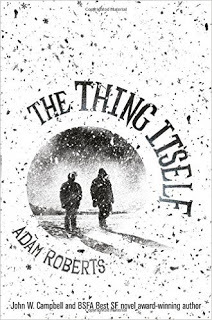 This latest book from the master of intellectual science fiction, Adam Roberts, is a mind-bending delight - and nothing like the combination of the title and the cover suggests (yet even this deception is not entirely straightforward). Anyone versed in the genre would instantly make the leap, with the combination of 'The Thing' and a polar setting, to the classic science fiction film The Thing - and indeed Roberts does make a passing bow to this in the opening of the book. However, the monster in the movie is about as crude as they come - here, what we experience as alien is both horrible and transfigured as a possible reality for the concept of god.
This latest book from the master of intellectual science fiction, Adam Roberts, is a mind-bending delight - and nothing like the combination of the title and the cover suggests (yet even this deception is not entirely straightforward). Anyone versed in the genre would instantly make the leap, with the combination of 'The Thing' and a polar setting, to the classic science fiction film The Thing - and indeed Roberts does make a passing bow to this in the opening of the book. However, the monster in the movie is about as crude as they come - here, what we experience as alien is both horrible and transfigured as a possible reality for the concept of god.Another classic theme we meet in the book is SETI - the search for extraterrestrial intelligence - but, once again, Roberts subverts the standard genre concepts. Here what is alien is not just not-human, but involves a different perception of the universe itself.
The way that Roberts makes this near-impossible portrayal of something truly alien come to life is to invoke the work of Immanuel Kant, where the 'Thing Itself' in the title is not so much a monster in the manner of the movie, but Kant's concept of the 'Ding an sich', which seems to be rather like Plato's world outside the cave where we only perceive via the shadows we see in the cave. However, in Kant's case this is taken to an extreme, where human perception of aspects of the universe like space, time and causality are simply our veneer on the underlying 'thing itself' which could be perceived totally differently by an alien species.
If this all sounds a bit heavy, it can be in places. There certainly is an awful lot of exposition and discussion of Kant and the relevance of his ideas to physics - and the implications of finding a way of messing around with the 'modalities' we perceive like space and time. In fact, while I'm in warning mode, I ought to also say there's a lot of sex of various ilks, and the book has my least favourite structure for a novel, having a main storyline in alternate chapters with a series of apparently unconnected chapters set in other times and places. I always find with this kind of structure that I want to get back to the main thread and tend to skip-read the intervening chapters - not helped in this case by one of them being written in a Joyce-like stream of consciousness that I really couldn't be bothered with.
So, without doubt this book is sometimes hard work. But it repays the effort of reading because it is so cleverly written (those apparently unconnected chapters slot nicely in by the end), because nothing is what you expect it to be, and because the idea of taking Kant's metaphysical waffling and turning it into science fiction is absolutely genius, producing one of the few ever glimpses I've ever seen of something truly alien in science fiction. And part of it is set in Swindon. What more can you ask?
I ought to briefly say something about the 'science fiction' label. One of the reviews quoted on the back of the book says 'in the tradition of Swift, Orwell and Atwood', which smacks to me of someone in typical literary fashion considering that something is 'not really science fiction' if it is well written and clever. It's a bit like the way I was recently interviewed about science fiction by a journalist who said that something I referred to presumably wasn't science fiction because there were no ray guns and spaceships. I am absolutely sure that Adam Roberts would proudly say that this book really is science fiction, and so he should, because this is classic SF material.
I can say without any doubt that this by far the best science fiction book I've read all year. I can also say that it won't be to everyone's taste - so don't blame me if you don't like it - but to some it will be a revelation of what science fiction can be. This is the kind of science fiction that should be winning the Booker Prize. Simple as that.
The Thing Itself is available from amazon.co.uk and amazon.com.
Published on December 30, 2015 08:16
December 28, 2015
A fair amount of dribbling - review
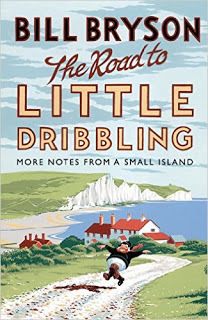 If you don't enjoy book reviews, I must apologise: as I work through my Christmas gift pile there will be quite a few.
If you don't enjoy book reviews, I must apologise: as I work through my Christmas gift pile there will be quite a few.I am a huge fan of Bill Bryson, so his new tour of Britain, The Road to Little Dribbling was an essential for me. I absolutely loved the way he gave an outsider's view to both delight in and be infuriated by Britain in his original Notes from a Small Island, and I expected more of the same. And to a degree I got them.
As usual with a Bryson book there is a mix of anecdotes, fascinating factoids and shrewd observations. I must admit these days I'm a little more suspicious of his content after reading he does fabricate a tad, and certainly his factoids are occasionally a little adrift from reality, but on the whole he knows his stuff, and this is the kind of book it's very difficult to resist reading out little snippets to friends and relations as you go. (In fact, I didn't resist.) Bryson manages once more to entertain most of the way, with a mix of enthusiasm for Britain and the good aspects of British values, and pointed remarks when we get it wrong. He has a clear and genuine love of the British countryside and knows what makes an attractive town. And at least one anecdote is genuinely gripping.
However, there are some issues. At times it seems as if what he really wants is Britain in the 1950s. He moans, for instance, about menus with fancy food and pesto, wanting us to go back to prawn cocktails and black forest gateaux... but at the same time he eats a lot of Indian food, which you wouldn't have been able to get back then. In reality British food has never been better, and this is just faux nostalgia. It's a bit like the way in his US books he longs for the old moth-eaten motels (which his family detest). It works there, because he's only half-serious, and because he has his family to put him right. Here, traveling on his own and taking it all pretty seriously, he just sounds strangely misplaced.
Bryson also moans about the demise of small town shops - which is sad, if inevitable - but also seems to moan about all the cafes that have sprung up, despite seeming to spend a lot of time in them. And it's just silly to bemoan the passing of old gentlemen's outfitters, which he admits he would never shop in, simply because they are quaint. It's not that he's missing the target when he shows how a lack of funds has meant that, for instance, many seaside towns have declined, but to equate this with 'everything was better in the past' isn't a useful or realistic observation.
The other complaint I have is that he doesn't give us the same degree of visit as he has in other books. It all seems a little routine and summary, perhaps because he has done some of it before. So we don't really get much of a feel for many of the places he visits, nor the same kind of delight at recognising quirks of places we know. He does at least, however, upgrade Cambridge in his opinion, after slating it in his first book in comparison with the far less attractive Oxford. (I may be biassed in this statement, but I genuinely find Cambridge far more pleasant to stroll around.)
Don't get me wrong, there's a lot still to like about this book. But it is a little too mired in the past - he's not that old - and there's too much of a feel that Bryson is doing it by numbers. I'm still giving it a 4 star rating, but only because the systems don't generally allow a 3.5.
The Road to Little Dribbling is available from amazon.co.uk and amazon.com.
Published on December 28, 2015 04:03
December 23, 2015
Quick Christmas Quiz
It's that time of year when no one can be bothered to do any real work. So here's a few little Christmas challenges for you. Answers down the bottom.
1. Which well-known Christmas song is almost always performed as just the chorus without the less familiar first verse starting like this:
2. Just mixing up my imp nieces? What Christmas delicacy am I cooking?
3. The Twelve days of Christmas song has 11 what?
4. Which Christmassy Poirot story by Agatha Christie is set in the fourteenth century manor house Kings Lacey (bizarrely made a 1920s building in the TV version)?
5. Ilex and Hedera. Not two rejected reindeer but...?
No Googling, please - all your own work.
While you get your answers together, the ad break...
/
/
/
/
If you enjoy a little mental quizzing, there's only one book to get your hands on this Christmas:

////
And here come the answers:
1. White Christmas2. Mince pies3. Pipers piping4. The Adventure of the Christmas Pudding5. Holly and Ivy
1. Which well-known Christmas song is almost always performed as just the chorus without the less familiar first verse starting like this:
2. Just mixing up my imp nieces? What Christmas delicacy am I cooking?
3. The Twelve days of Christmas song has 11 what?
4. Which Christmassy Poirot story by Agatha Christie is set in the fourteenth century manor house Kings Lacey (bizarrely made a 1920s building in the TV version)?
5. Ilex and Hedera. Not two rejected reindeer but...?
No Googling, please - all your own work.
While you get your answers together, the ad break...
/
/
/
/
If you enjoy a little mental quizzing, there's only one book to get your hands on this Christmas:

////
And here come the answers:
1. White Christmas2. Mince pies3. Pipers piping4. The Adventure of the Christmas Pudding5. Holly and Ivy
Published on December 23, 2015 08:37
December 17, 2015
What is a science quiz book?
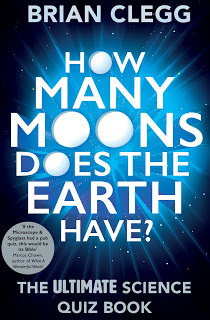 If you are panicking about last minutes presents, I can (in an entirely unbiased way) heartily recommend my bargain priced science quiz book
How Many Moons Does the Earth Have?
You can get it at book stores, Amazon.co.uk and (with free worldwide delivery) Book Depository. But there has been a certain amount of confusion about what's actually in it.
If you are panicking about last minutes presents, I can (in an entirely unbiased way) heartily recommend my bargain priced science quiz book
How Many Moons Does the Earth Have?
You can get it at book stores, Amazon.co.uk and (with free worldwide delivery) Book Depository. But there has been a certain amount of confusion about what's actually in it.The book is divided into two 'quizzes' - each has six rounds of eight questions, plus two special rounds with things like pictures questions and puzzles. So you could use it in a traditional pub quiz format. But the main intention is just to read through and enjoy testing yourself, so it's much more than just a collection of questions and answers. It's probably best if I come up with a specific example, and as an anonymous commenter berated me about doing a Santa-related post yesterday, I know exactly which one to give.
A question page looks like this, with the question itself and a few 'while you're thinking' factoids... but the answer is over the page, so you can sort out your answer before peeking.

As we don't have a page turn on the blog......I'll give you a moment to think......Before you scroll down......As the equivalent of a page turn......

So it's not just the answer, but also an exploration of the topic in a little more detail, plus a book where you can read more (all the referenced books are detailed at the back).
In case you've now realised this is something you need to buy for those last minute gifts, here's the purchase details again: you can get it at book stores, Amazon.co.uk and (with free worldwide delivery) Book Depository.
Published on December 17, 2015 01:16
December 16, 2015
Santa logic
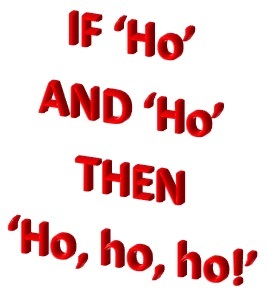 I was impressed to read some impressively logical thinking about movies featuring Santa Claus / Father Christmas the other day. You know the kind of film I mean. Those like Elf and The Santa Clause, where cynical adults who don't believe in the jolly rotund fellow get their come-uppance. There's a distinct logical flaw in these movies.
I was impressed to read some impressively logical thinking about movies featuring Santa Claus / Father Christmas the other day. You know the kind of film I mean. Those like Elf and The Santa Clause, where cynical adults who don't believe in the jolly rotund fellow get their come-uppance. There's a distinct logical flaw in these movies.Before I disclose the gaping hole, I need to address an obvious objection to my endeavour. Surely to worry about logic in a merry seasonal fantasy misses the point? However, I've always argued that, while fantasy can clearly change whatever rules it likes, once the nature of the fantasy world is established, it should be logically consistent. This is why I don't have trouble with vampires and werwolves and slayers and magic in Buffy the Vampire Slayer, because that is the part of the rules of the world. But I do have a bit of an issue when a hobbyist manages to come up with a robot that is all but indistinguishable from a human being - because the technology in Buffy is the technology of our world, and that just isn't possible.
So back to the Santa flaws. (It's just one flaw really, but 'Santa flaws' sounds much better.) The article I was reading (sadly I've lost the link) pointed out that, in these films, Santa Claus is real and goes around the world delivering (at least one) present(s) to good children on Christmas Eve. That's fine. That's part of the premise of the movie. But bearing in mind these presents magically turn up in everyone's house each Christmas morning, why would anyone not believe in Santa? That just doesn't make sense. And without logic, the magic falls apart.
Ho, ho, no.
Published on December 16, 2015 02:47
December 15, 2015
Beware Star Wars expectations
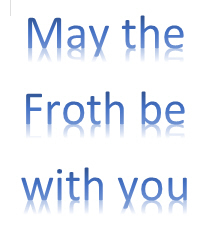 If you have managed to avoid the Star Wars hype so far, you live in a concrete bunker, and only read this blog when someone pushes a printed copy under your door. I couldn't even escape it on the train to Bristol this morning, as one of my fellow passengers had a ringtone of the Star Wars theme and a text message alert of R2D2 blurping. The novelty value soon wore thin.
If you have managed to avoid the Star Wars hype so far, you live in a concrete bunker, and only read this blog when someone pushes a printed copy under your door. I couldn't even escape it on the train to Bristol this morning, as one of my fellow passengers had a ringtone of the Star Wars theme and a text message alert of R2D2 blurping. The novelty value soon wore thin.Don't get me wrong. I absolutely loved the original Star Wars film. I saw it three times and even got an abridged version of the first act on 8mm film (no, we didn't have DVDs back then). My favourite computer games ever were those in the X-Wing series. However, I am convinced part of the reason the movie was so good was that, like most science fiction fans, I went along to see it with almost zero expectations. I knew it was going to be Saturday Morning Cinema, 1920s space opera schlock. And it was - but what took me by surprise was that it was absolute brilliant Saturday Morning Cinema, 1920s space opera schlock.
At roughly the same time, another science fiction movie came out - Close Encounters of the Third Kind. For that, I had huge expectations - and as a result it was a disappointment. I now quite like the film (at least, in the version where Spielberg trimmed the endless hours of characters making copies of Devil's Tower), but back then, with expectations rampant, it was a depressing let down.
To be honest, I don't know if I can be bothered to go to the new Star Wars movie - but if I do, it will be with expectations suitably lowered. That way, I hope that I will have the same transformative thrill as the first time round. But for all my Star Wars obsessed friends, please (please) don't expect too much. I don't want you grumpy all through Christmas.
Published on December 15, 2015 01:44
December 14, 2015
Idiocy labelled science
 I do like something irritating to wake my brain up on a Monday morning, and today the best newspaper in the UK (genuinely), the i, managed to do this with a double whammy.
I do like something irritating to wake my brain up on a Monday morning, and today the best newspaper in the UK (genuinely), the i, managed to do this with a double whammy.They ran a story in which the only 'news' was that an astronaut's dad had said something stupid, and then had the nerve to label the story 'science'.
The entire basis for the story was a comment from the father of British astronaut-to-be, Tim Peake. His father, Nigel, is quoted as saying 'I'm more worried about him driving home on the M27. That's far more dangerous, believe me, than going up there.'
So, in what sense is this news or science? The only vaguely scientific thing in the story was the extreme misuse of statistics, which we'll examine in a moment, and though I'd rather we had astronauts in the news than X-Factor winners (I'm pleased to say that I neither know nor care who won), I really have very little interest in Nigel. I'm sorry Nigel, but I don't.
How about those stats, then? Is a trip on the M27 far more dangerous than riding a space rocket? You might not be shocked to discover that the answer is 'No, it isn't.' After a lot of fibbing over the years, NASA had to admit that the risk of dying on any particular space flight is about 1 in 100. How does this compare with the M27? I don't have specific stats, but lets look at the nationwide figures*. These put the chance of dying on any particular car journey as less likely than 1 in 23 million.
I know which is more dangerous, believe me, and it's not the M27.
* Statistical honesty: the figure I give for chance of dying is wrong, but it is likely to be too high a risk, rather than too low. Two figures I used were dubious. I based my number on the UK road deaths figures, which includes pedestrians and cyclists, neither of whom are relevant here. Also, in the five minutes I was prepared to dedicate to researching the data, I could only find UK figures for vehicle miles, not vehicle journeys. I divided this by the average journey length (just 7 miles - get on your bikes!), but this would not produce an accurate figure for vehicle journeys. However, it's close enough for the purposes.
Published on December 14, 2015 02:27
December 10, 2015
Do car engines need to be so inefficient?
 Car engines could be a lot better than they currently are. This is not some oil industry conspiracy, but a simple reflection that the design is pretty creaky. It has been around a long while. And, of course, cars are currently about as green as something that isn't very green at all.
Car engines could be a lot better than they currently are. This is not some oil industry conspiracy, but a simple reflection that the design is pretty creaky. It has been around a long while. And, of course, cars are currently about as green as something that isn't very green at all.It's remarkable that the internal combustion engine, the heart of travel industry still, is so impressively inefficient. Around 25% of the energy generated from the fuel is actually used to move the car.
Eventually I have no doubt we'll all be driving electric cars - we're just waiting for a shift in battery technology that seems pretty close on the horizon. (If I had the money, I'd be driving a Tesla right now.) But there are bound to be decades of gradual transition when we still need to make use of fossil fuels.
I've had pointed out this remarkable project to produce an engine that should increase efficiency of an internal combustion engine more than twofold. It's a turbine-like design, but a variant that reduces the complexity of technical problems with turbines, plus has only one moving part.
Will it work? To paraphrase Scotty on Star Trek, I'm a writer Jim, not an engineer. Clearly the claim in the video that this could 'reduce global CO2 emissions by up to 20 per cent in the next five years' is not viable. Given that a prototype doesn't exist yet, it's hardly going to change the world in five years. What's more, the website is somewhat vague about what fuel the engine uses, but I'm guessing LPG, in which case it's not just a matter of needing new cars with new engines, but also a distribution network for a fuel that isn't currently widely available. Even so, the prospect of an internal combustion engine that is so much more efficient than current designs is an impressive one.
You can find out more at www.tomorrowsengine.com
Published on December 10, 2015 00:31
December 9, 2015
Ten most influential movies?
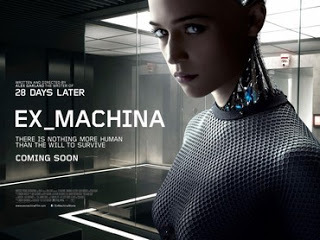 Poster for one of my top 10 ten influential SF movies
Poster for one of my top 10 ten influential SF movies(Image from Wikipedia )As a result of the recent publication of Ten Billion Tomorrows , examining the interplay between science and science fiction, I recently did an article with Business Insider on what I consider to be the ten most influential movies.
I'm not going to list them here - you can find out in Business Insider's fun article, but I did think it worth mentioning the way that I selected them.
It all depends, of course, on what you mean by 'influential.' If, for example, you meant 'shaping the way Hollywood viewed science fiction', then I would have to have included Star Wars, which dragged SF kicking and screaming out of the B movie slot. But instead I was looking at movies that were (or will be - two were from 2015) influential on individuals to take an interest in science or become scientists.
This explains two woeful omissions, if I had been attempting just a 'best science fiction films' list - Metropolis and Blade Runner. Both were extremely impressive visually. Lang's Metropolis set the look of the future for many, and had that early humanoid robot. And Scott's Blade Runner similarly defined a new, gritty look for other future-set films. However neither were the kind of movie that would get a watcher all excited about science - they are both dystopian and present science and technology as something close to evil.
Another film that has had much acclaim that I didn't include was Interstellar. But I didn't feel I needed to include that, as Contact was the original for much of the science and I felt that Interstellar tried to hard visually, losing the storytelling.
At least one of the films in my list is hard to justify, except that it's one of my favourite films (and it includes some concepts that are rare in science fiction in the movies). I'd also say that there's an element of provocation there. After all, what's the point of a list like this if you don't argue with it.
So feel free to tell me I was wrong...
Published on December 09, 2015 01:17
December 8, 2015
Bumper book day!
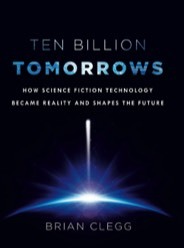 Rather embarrassingly, two books I have been involved with are published today. The first is
Ten Billion Tomorrows
. Like many people involved with science I was (and am still to some extent) an enthusiastic reader of science fiction as a teenager. In this book I explore the relationship between science and science fiction.
Rather embarrassingly, two books I have been involved with are published today. The first is
Ten Billion Tomorrows
. Like many people involved with science I was (and am still to some extent) an enthusiastic reader of science fiction as a teenager. In this book I explore the relationship between science and science fiction.It's not always what we expect. Clearly science fiction is inspired by science, the clue's in the name - but what happens the other way round? There's a tendency to think of science fiction as predicting the future, at which it is, frankly, very bad. The vast majority of 'predictions' from science fiction, even from impeccable sources like 2001 a Space Odyssey have had a terrible hit rate. Luckily, though, that's not what it's really about. Science fiction uses the threats, challenges and experiences generated by science and technology to ask 'What If?' - to see how humans react in the face of those provocations. That being the case, we don't see science fiction predicting the future, we see it inspiring individuals to become scientists and sometimes pushing them in particular directions. Not necessarily to make a science fiction concept a reality, but to make use of the vision it gives.
I didn't want the book to be just a collection of hundreds of different science fiction concepts, so I focussed on a relative few, from robots and recreated extinct life to tractor beams and artificial intelligence, and looked at the differences and similarities between the science fiction image and the reality in science and technology. I hope this will appeal to every science and science fiction fan. You can find out more (and order a copy!) from the book's web page.
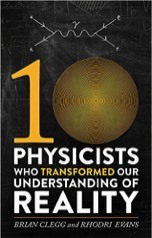 Second off the blocks is
Ten Physicists Who Transformed our Understanding of Reality
, the brainchild of astronomer Rhodri Evans, which I co-authored. The idea was to take a list of the 'ten greatest physicists' and give a short scientific biography of each. Part of the fun was debating that list. We intentionally didn't choose our own but went for an existing one, so we could have the enjoyment of disagreeing with some aspects of it. (Come on, it puts Einstein fourth.) But whether or not it's the ideal ten (counter to our hearts, we suggest that we really should have dropped both Marie Curie and Richard Feynman), they're a fascinating bunch who have all contributed to our understanding of the world around us, with stories that could be better known.
Second off the blocks is
Ten Physicists Who Transformed our Understanding of Reality
, the brainchild of astronomer Rhodri Evans, which I co-authored. The idea was to take a list of the 'ten greatest physicists' and give a short scientific biography of each. Part of the fun was debating that list. We intentionally didn't choose our own but went for an existing one, so we could have the enjoyment of disagreeing with some aspects of it. (Come on, it puts Einstein fourth.) But whether or not it's the ideal ten (counter to our hearts, we suggest that we really should have dropped both Marie Curie and Richard Feynman), they're a fascinating bunch who have all contributed to our understanding of the world around us, with stories that could be better known.Find out more (and buy a copy if you fancy) from the book's web page.
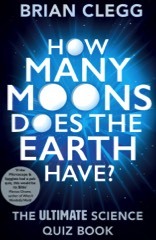 Finally, although out a few weeks now, I ought to get a mention in of my science quiz book,
How Many Moons Does The Earth Have
. It's an ideal stocking filler (at the time of writing the paperback was available at less than £5 - bargain or what?), designed for those difficult to buy for people (or, even better, for yourself). The idea is that you get to test yourself against loads of fun questions, turning the page to see the often surprising answer, and then having a page of interesting expansion on the answer, so it's far more than just a Q and A. From acid-taking-elephants to those nominal moons, there's a whole lot going on in there.
Finally, although out a few weeks now, I ought to get a mention in of my science quiz book,
How Many Moons Does The Earth Have
. It's an ideal stocking filler (at the time of writing the paperback was available at less than £5 - bargain or what?), designed for those difficult to buy for people (or, even better, for yourself). The idea is that you get to test yourself against loads of fun questions, turning the page to see the often surprising answer, and then having a page of interesting expansion on the answer, so it's far more than just a Q and A. From acid-taking-elephants to those nominal moons, there's a whole lot going on in there.Find out more and buy a stack for easy presents (or just buy it for your own entertainment) at the book's web page.
Published on December 08, 2015 01:30



